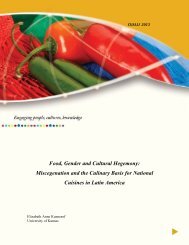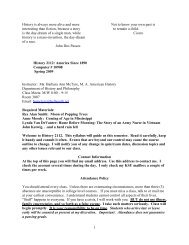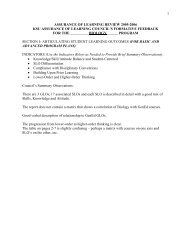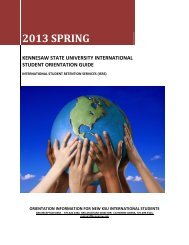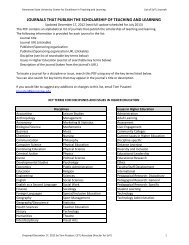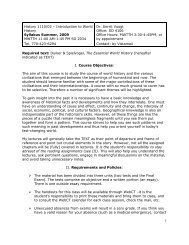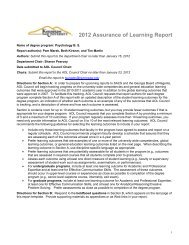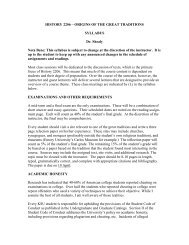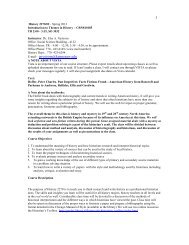Thirst and the Writer's Sense of Consequence - Kennesaw State ...
Thirst and the Writer's Sense of Consequence - Kennesaw State ...
Thirst and the Writer's Sense of Consequence - Kennesaw State ...
You also want an ePaper? Increase the reach of your titles
YUMPU automatically turns print PDFs into web optimized ePapers that Google loves.
<strong>Kennesaw</strong> Review, Spring 2003 1<br />
<strong>Thirst</strong> <strong>and</strong> <strong>the</strong> Writer’s <strong>Sense</strong> <strong>of</strong> <strong>Consequence</strong><br />
By David Bottoms<br />
A few weeks ago while thumbing through a new anthology, I ran across a little poem I<br />
hadn’t seen in years. It’s a well-known poem by Walt Whitman called “A Noiseless Patient<br />
Spider”:<br />
A noiseless patient spider,<br />
I mark’d where on a little promontory it stood isolated,<br />
Mark’d how to explore <strong>the</strong> vacant vast surrounding,<br />
It launch’d forth filament, filament, filament, out <strong>of</strong> itself,<br />
Ever unreeling <strong>the</strong>m, ever tirelessly speeding <strong>the</strong>m.<br />
And you O my soul where you st<strong>and</strong>,<br />
Surrounded, detached, in measureless oceans <strong>of</strong> space,<br />
Ceaselessly musing, venturing, throwing, seeking <strong>the</strong> spheres to connect <strong>the</strong>m,<br />
Till <strong>the</strong> bridge you will need be form’d, till <strong>the</strong> ductile anchor hold,<br />
Till <strong>the</strong> gossamer thread you fling catch somewhere, O my soul.<br />
I had always admired <strong>the</strong> beautiful way this poem catches <strong>the</strong> human need to connect, to<br />
empathize <strong>and</strong> to find empathy, to love <strong>and</strong> be loved, <strong>and</strong> <strong>the</strong> way it suggests <strong>the</strong> writer’s role as<br />
an explorer <strong>of</strong> <strong>the</strong> unknown, who seeks “<strong>the</strong> spheres to connect <strong>the</strong>m,” who seeks <strong>the</strong> mysteries<br />
to tie <strong>the</strong>m all toge<strong>the</strong>r. But what surprised me <strong>and</strong> intrigued me on this re-reading was its<br />
urgency <strong>of</strong> longing <strong>and</strong> <strong>the</strong> sweep <strong>of</strong> its immeasurable range. Once again I started to ponder <strong>the</strong><br />
whole question <strong>of</strong> artistic sensibility, more specifically, <strong>the</strong> sensibility that gives impulse to
<strong>Kennesaw</strong> Review, Spring 2003 2<br />
poetry <strong>and</strong> literary fiction. What I’m talking about is <strong>the</strong> characteristic <strong>of</strong> personality that<br />
makes a writer seek serious expression through language, <strong>the</strong> impulse that makes <strong>the</strong> soul launch<br />
forth “filament, filament, filament, out <strong>of</strong> itself.” Robert Penn Warren suggested that this<br />
impulse was, in his case, <strong>the</strong> quality <strong>of</strong> spiritual yearning. “I am a creature <strong>of</strong> this world,” he told<br />
Peter Stitt in a 1977 interview, “but I am also a yearner, I suppose.” Though he had “no<br />
<strong>the</strong>ology,” he said, <strong>the</strong> world seemed to him infused with hidden spiritual significance, <strong>and</strong> he<br />
yearned for verification <strong>of</strong> this (Stitt 243).<br />
I’m attracted to this notion <strong>of</strong> <strong>the</strong> “yearner,” what Charles Wright calls “a thirst,” because<br />
it echoes strongly in many <strong>of</strong> my earliest memories <strong>of</strong> reading. Two come immediately to mind.<br />
In <strong>the</strong> first I’m in <strong>the</strong> seventh or eighth grade, sitting in our living room in Canton, Georgia,<br />
prowling through a story by Edgar Allan Poe. I believe this was my first encounter with <strong>the</strong> illomened<br />
spirit <strong>of</strong> <strong>the</strong> Lady Ligeia <strong>and</strong> her efforts to find bodily re-entry into this world, but that<br />
part <strong>of</strong> <strong>the</strong> memory has faded. What’s left is only <strong>the</strong> feel <strong>of</strong> our s<strong>of</strong>a, a halo <strong>of</strong> yellow light<br />
struggling through a lampshade, <strong>and</strong> most importantly, a still powerful sense <strong>of</strong> pursuit, <strong>of</strong> quest,<br />
<strong>of</strong> anticipation <strong>of</strong> discovery pulsing through me.<br />
Ano<strong>the</strong>r memory in which this feeling is especially intense is <strong>of</strong> an evening a year or so<br />
later. I’m sitting in our living room, on that same couch, in <strong>the</strong> yellow light <strong>of</strong> that same lamp,<br />
reading in <strong>the</strong> Collected Poems <strong>of</strong> W. B. Yeats, which I’ve checked out <strong>of</strong> <strong>the</strong> county library.<br />
I’m baffled, but caught, helpless. A few puzzling images have dug in like hooks — a fly with<br />
long legs moving over silent water, <strong>the</strong> sleepy soldiers <strong>of</strong> some Emperor, a creature with <strong>the</strong><br />
body <strong>of</strong> a lion <strong>and</strong> <strong>the</strong> head <strong>of</strong> a man. Of course, I understood little or nothing <strong>of</strong> Yeats’s<br />
meanings. However, I sensed deeply <strong>the</strong> anticipation, <strong>the</strong> desire to discover, that prompted me to
<strong>Kennesaw</strong> Review, Spring 2003 3<br />
dig into those mysterious poems <strong>and</strong> plow, as best as I could, through <strong>the</strong>ir strange sounds <strong>and</strong><br />
imagery.<br />
That anticipation, which I still experience occasionally when reading, is certainly why I<br />
fell in love with stories <strong>and</strong> poems <strong>and</strong> ultimately, no doubt, with <strong>the</strong> notion <strong>of</strong> trying to write<br />
<strong>the</strong>m. It was a sense <strong>of</strong> anticipation, which I had come to associate exclusively with books.<br />
Nothing else carried <strong>the</strong> same emotional ache, <strong>the</strong> same promise <strong>of</strong> adventure <strong>and</strong> revelation—<br />
not sports, not school, <strong>and</strong> at that age, not even girls. I remember <strong>the</strong> way it flowed through me<br />
as I flipped <strong>the</strong> pages, looking for an interesting title, a promising poem. Though I would not<br />
have been able to name it <strong>the</strong>n, I underst<strong>and</strong> it now as a feeling <strong>of</strong> consequence. Something<br />
about Yeats’s poems seemed significant in purpose. Something about those poems felt as though<br />
<strong>the</strong>y might point me in <strong>the</strong> direction <strong>of</strong> consequence in <strong>the</strong> world <strong>and</strong>, perhaps, in ano<strong>the</strong>r world.<br />
Those poems seemed to be on <strong>the</strong> trail <strong>of</strong> something, an answer to a question I carried inside<br />
myself, a sense <strong>of</strong> significance deeper than my individual life, a meaning for which, in Warren’s<br />
sense, I seemed to be yearning.<br />
* * *<br />
I try to teach writing, <strong>and</strong> I try to write, so occasionally I think about <strong>the</strong> creative process<br />
<strong>and</strong> <strong>the</strong> mission <strong>and</strong> <strong>of</strong>fices <strong>of</strong> <strong>the</strong> writer. Most folks <strong>the</strong>se days who are interested in teaching<br />
<strong>the</strong> craft <strong>of</strong> poems, stories, <strong>and</strong> novels are in <strong>the</strong> business <strong>of</strong> demystifying <strong>the</strong> writing process <strong>and</strong><br />
<strong>the</strong> role <strong>of</strong> <strong>the</strong> writer in <strong>the</strong> world. Evidence <strong>of</strong> this abounds in <strong>the</strong> enormous stack <strong>of</strong> practical<br />
writing guides that have been published over <strong>the</strong> past few years — books that tell us everything<br />
we’d ever want to know about <strong>the</strong> particulars <strong>of</strong> syntax, character development, symbolism, or<br />
figurative language — but tell us little or nothing about <strong>the</strong> creative process itself. Never, in<br />
fact, have I seen <strong>the</strong> authors <strong>of</strong> any <strong>the</strong>se guides even attempt to talk about <strong>the</strong> nature <strong>of</strong> <strong>the</strong>
<strong>Kennesaw</strong> Review, Spring 2003 4<br />
creative urge <strong>and</strong> how that might define <strong>the</strong> relationship between <strong>the</strong> writer <strong>and</strong> <strong>the</strong> world. This<br />
is perilous territory, true, where one must step cautiously along <strong>the</strong> borders <strong>of</strong> psychology <strong>and</strong><br />
mysticism, <strong>and</strong> conversation here has become difficult because it requires broad statements that<br />
are ultimately insupportable—a misdemeanor, at least, in a scientific <strong>and</strong> secular culture such as<br />
ours.<br />
A case in point. A few months ago I was talking to a group <strong>of</strong> young poets, <strong>and</strong> our<br />
conversation bounced from <strong>the</strong> creative process to world-view to God. I asked <strong>the</strong>m <strong>the</strong>n to<br />
think for a moment <strong>and</strong> silently to categorize <strong>the</strong>mselves as believers, agnostics, or nonbelievers.<br />
A general embarrassment broke out, <strong>and</strong> after a few seconds I said, “Okay, if you find<br />
yourself among <strong>the</strong> first two groups, you may have a chance <strong>of</strong> becoming a serious poet. If you<br />
count yourself among <strong>the</strong> latter, your chances may be greatly diminished.” A look <strong>of</strong> pr<strong>of</strong>ound<br />
discomfort fell across many faces in <strong>the</strong> room. Some people were clearly angry. One fellow had<br />
taken out a small but ominous-looking pocketknife, <strong>and</strong> <strong>the</strong> young woman beside him appeared<br />
to be twisting her hair ribbon into a noose.<br />
The totally insupportable thing that I said to those young poets <strong>and</strong> want to repeat now is<br />
that <strong>the</strong> greatest writers, <strong>the</strong> writers who touch <strong>the</strong>ir readers at <strong>the</strong> deepest emotional <strong>and</strong><br />
psychological levels, are most frequently those poets <strong>and</strong> storytellers who are yearners after<br />
meaning. I’m inclined to say that this br<strong>and</strong> <strong>of</strong> yearning is, indeed, <strong>the</strong> characteristic that gives<br />
impulse to all good poetry, <strong>and</strong> perhaps all pr<strong>of</strong>ound art <strong>and</strong>
<strong>Kennesaw</strong> Review, Spring 2003 5<br />
science. It’s <strong>the</strong> simple but insistent longing to discover significance in <strong>the</strong> world, <strong>the</strong> need to<br />
underst<strong>and</strong> not only how <strong>the</strong> world works, but why. We usually associate this sort <strong>of</strong> desire with<br />
science <strong>and</strong> philosophy, but that doesn’t mean it’s any less prevalent in art. The creative urge<br />
itself indicates a hunger for order <strong>and</strong> purpose in a world that only grudgingly gives up any<br />
evidence <strong>of</strong> such. In this sense <strong>the</strong> highest function <strong>of</strong> <strong>the</strong> creative act is <strong>the</strong> quest for <strong>the</strong> key to<br />
creation’s puzzle. Should it surprise us <strong>the</strong>n that <strong>the</strong> writers who affect readers most deeply are<br />
those poets <strong>and</strong> storytellers who have not ab<strong>and</strong>oned hope for <strong>the</strong> possibility <strong>of</strong> <strong>the</strong> human soul?<br />
What <strong>the</strong> a<strong>the</strong>ist gives up, but what <strong>the</strong> believer <strong>and</strong> <strong>the</strong> agnostic may share, is that sense <strong>of</strong> hope,<br />
that yearning to discover some ultimate purpose in one’s life <strong>and</strong> in <strong>the</strong> world. Flannery<br />
O’Connor suggests a similar notion in her essay “Novelist <strong>and</strong> Believer”:<br />
The novelist doesn’t write about people in a vacuum; he writes about people in a<br />
world where something is obviously lacking, where <strong>the</strong>re is <strong>the</strong> general mystery<br />
<strong>of</strong> incompleteness [. . .], <strong>and</strong> <strong>the</strong> novelist tries to give you, within <strong>the</strong> form <strong>of</strong> <strong>the</strong><br />
book, a total experience <strong>of</strong> human nature at any time. For this reason <strong>the</strong> greatest<br />
dramas naturally involve <strong>the</strong> salvation or loss <strong>of</strong> <strong>the</strong> soul. Where <strong>the</strong>re is no belief<br />
in <strong>the</strong> soul, <strong>the</strong>re is very little drama. (167)<br />
True enough. Where <strong>the</strong>re is no belief in <strong>the</strong> soul, or no belief in <strong>the</strong> possibility <strong>of</strong> <strong>the</strong> soul, <strong>the</strong>re<br />
is, truly, very little at stake. Significance never stretches far beyond our present moment in<br />
history — what we did yesterday, what we expect to do tomorrow or <strong>the</strong> next, all a series <strong>of</strong><br />
events moving inevitably toward one conclusion. And for <strong>the</strong> writer who ab<strong>and</strong>ons hope for <strong>the</strong><br />
soul, even <strong>the</strong> writer who is grateful for life in <strong>the</strong> present moment, <strong>the</strong> voice can turn too easily<br />
to lamentation <strong>and</strong> cynicism.
<strong>Kennesaw</strong> Review, Spring 2003 6<br />
Though testing O’Connor’s notion against <strong>the</strong> canon <strong>of</strong> world literature is something<br />
slightly beyond <strong>the</strong> scope <strong>of</strong> my expertise, I feel fairly safe in asserting that <strong>the</strong> eternal is always<br />
more significant than <strong>the</strong> temporal. Still, many <strong>of</strong> us will probably be tempted to run this notion<br />
through a few <strong>of</strong> our favorite books. After I came across that passage in O’Connor’s essay, I<br />
immediately thought <strong>of</strong> a h<strong>and</strong>ful <strong>of</strong> my own favorite novels. Two are by Dostoevsky, The<br />
Bro<strong>the</strong>rs Karamazov <strong>and</strong> Crime <strong>and</strong> Punishment, <strong>and</strong> following closely come Hawthorne’s The<br />
Scarlet Letter <strong>and</strong> Melville’s Moby-Dick. Every few years I read <strong>the</strong>se books again, <strong>and</strong> I think<br />
now that what continues to draw me to <strong>the</strong>se novels, <strong>and</strong> what seems to link <strong>the</strong>m to o<strong>the</strong>r great<br />
novels, is <strong>the</strong> pr<strong>of</strong>ound religious sensibility that pervades <strong>the</strong>m. In each story this sensibility is a<br />
dramatically crucial, indeed defining, attribute. For instance, imagine The Bro<strong>the</strong>rs Karamazov<br />
absent Alyosha’s concern for Dmitri’s soul or Ivan’s agonizing “The Gr<strong>and</strong> Inquisitor,” or<br />
imagine The Scarlet Letter without <strong>the</strong> religious consequences <strong>of</strong> Dimmesdale <strong>and</strong> Hester’s<br />
adultery. In Moby-Dick this sensibility expresses itself more symbolically, but it’s still a<br />
powerful <strong>and</strong> dominant presence in <strong>the</strong> quest for <strong>the</strong> white whale. Without <strong>the</strong>se spiritual<br />
dimensions we’d have only a few pretty good adventure stories. This is <strong>the</strong> very characteristic in<br />
Flannery O’Connor’s fiction that links her more closely to <strong>the</strong>se great novelists than to fellow<br />
writers <strong>of</strong> <strong>the</strong> modern Sou<strong>the</strong>rn gothic, with whom she is <strong>of</strong>ten grouped. For instance, if we<br />
remove <strong>the</strong> Catholic foundation from O’Connor’s work, what we have left is <strong>the</strong> grotesque<br />
fiction <strong>of</strong> Erskine Caldwell or Harry Crews.<br />
* * *<br />
I’m not trying to say that every good writer is a religious person. I am suggesting,<br />
though, that <strong>the</strong> greatest writers seem to be those folks who exhibit a religious sensibility, at least<br />
in <strong>the</strong> sense <strong>of</strong> probing <strong>the</strong> pr<strong>of</strong>ound questions <strong>of</strong> <strong>the</strong> human predicament. Of his own
<strong>Kennesaw</strong> Review, Spring 2003 7<br />
experience, Warren said in that same interview with Stitt, “I would call this temperament ra<strong>the</strong>r<br />
than <strong>the</strong>ology [. . .] that is, I feel an immanence <strong>of</strong> meaning in things, but I have no meaning to<br />
put <strong>the</strong>re that is interesting or beautiful. I think I put it as close as I could in a poem called<br />
“Masts at Dawn” — “We must try / To love so well <strong>the</strong> world that we may believe, in <strong>the</strong> end, in<br />
God” (243).<br />
I’ve always loved that line because it points beautifully to <strong>the</strong> writer’s proper approach<br />
toward <strong>the</strong> world, which is always through a sense <strong>of</strong> awe. “We must try,” Warren says, which<br />
is sufficient witness to that condition <strong>of</strong> yearning, that state <strong>of</strong> longing. We desire meaning in<br />
our lives, we yearn for significance; <strong>the</strong>refore, we must try to find it in <strong>the</strong> objects <strong>and</strong> actions <strong>of</strong><br />
<strong>the</strong> world. This is, for Warren, <strong>the</strong> charge <strong>of</strong> <strong>the</strong> writer — to be an explorer, a searcher, a seeker<br />
<strong>of</strong> <strong>the</strong> ultimate. His starting point, <strong>and</strong> ours, is <strong>the</strong> physical world, but his goal is <strong>the</strong> revelation<br />
<strong>of</strong> meaning behind <strong>the</strong> operations <strong>of</strong> <strong>the</strong> world. As he says in a wonderful poem about his<br />
parents, “I Am Dreaming <strong>of</strong> a White Christmas: The Natural History <strong>of</strong> a Vision”:<br />
All items listed above belong in <strong>the</strong> world<br />
In which all things are continuous,<br />
And are parts <strong>of</strong> <strong>the</strong> original dream which<br />
I am now trying to discover <strong>the</strong> logic <strong>of</strong>. (34)<br />
We, <strong>of</strong> course, did not dream “<strong>the</strong> original dream,” <strong>and</strong>, being inside <strong>the</strong> dream, we are<br />
incapable <strong>of</strong> comprehending its total meaning. Still, glimpses <strong>of</strong> that meaning suggest<br />
<strong>the</strong>mselves to us at various moments in our lives, <strong>and</strong> <strong>the</strong> possibility <strong>of</strong> puzzling those glimpses<br />
into a complete picture eats at us constantly.<br />
* * *
<strong>Kennesaw</strong> Review, Spring 2003 8<br />
I remember James Dickey sitting at my dining room table one morning back in <strong>the</strong> mideighties.<br />
We’d gotten up late <strong>and</strong> had skipped breakfast, so we’d raided <strong>the</strong> fridge for what was<br />
left <strong>of</strong> a honeybaked ham. I don’t remember what we’d been talking about, but Dickey was<br />
picking at <strong>the</strong> ham with his fingers <strong>and</strong> doing a fine job <strong>of</strong> finishing it <strong>of</strong>f, when he glared at me<br />
across <strong>the</strong> table. He took one <strong>of</strong> his long thoughtful breaths <strong>and</strong> bared his teeth. “You know,” he<br />
said, “sometimes I think I can almost see right through it, right through it all, right to <strong>the</strong> bone.”<br />
He wasn’t talking about ham, <strong>of</strong> course, but about those rare <strong>and</strong> teasing moments <strong>of</strong><br />
clarity when we think that we might just see into absolute core <strong>of</strong> things. He’d experienced<br />
moments <strong>of</strong> clarity so intense, he said, that he felt if he could just tie <strong>the</strong>m all toge<strong>the</strong>r, just draw<br />
a line between <strong>the</strong>m in <strong>the</strong> way one might connect <strong>the</strong> dots <strong>of</strong> a puzzle, he would have an outline<br />
<strong>of</strong> <strong>the</strong> true story. (His version, I suppose, <strong>of</strong> Whitman’s soul as spider “seeking <strong>the</strong> spheres to<br />
connect <strong>the</strong>m.”) James Joyce, <strong>of</strong> course, called <strong>the</strong>se moments <strong>of</strong> clarity “epiphanies,” a<br />
religious word he secularized to refer to a deep insight. Wordsworth called <strong>the</strong>m “spots <strong>of</strong> time.”<br />
Out <strong>of</strong> <strong>the</strong>se moments, good writers, when lucky, make good poems <strong>and</strong> stories, <strong>and</strong> so each<br />
poem or story is, in its own way, a dot in Dickey’s puzzle. The poet or <strong>the</strong> fiction writer who<br />
wants to touch readers on <strong>the</strong> deepest level is constantly seeking out those dots <strong>and</strong> trying to<br />
connect <strong>the</strong>m, acting against desperate odds on <strong>the</strong> impulse <strong>of</strong> yearning to know. In this way,<br />
literature becomes a record <strong>of</strong> <strong>the</strong> ways <strong>the</strong> world moves us toward a sense <strong>of</strong> significance. The<br />
world is constantly trying to tell <strong>the</strong> poet something, Warren liked to suggest. But <strong>the</strong> world is<br />
coy. It will not explain itself outright. Its strategies are <strong>the</strong> strategies <strong>of</strong> <strong>the</strong> poem. Its language<br />
is imagery, its method innuendo. It teases us, lures us, prods us toward discovery, <strong>and</strong> if we are<br />
to learn what it has to reveal, we must accept <strong>the</strong> challenge <strong>of</strong> <strong>the</strong> quest. These well-known lines
<strong>Kennesaw</strong> Review, Spring 2003 9<br />
from <strong>the</strong> concluding section <strong>of</strong> “Audubon: A Vision” describe Warren’s first waking up to <strong>the</strong><br />
mysteries <strong>of</strong> <strong>the</strong> world:<br />
Long ago in Kentucky, I, a boy, stood<br />
By a dirt road, in first dark, <strong>and</strong> heard<br />
The great geese hoot northward.<br />
I could not see <strong>the</strong>m, <strong>the</strong>re being no moon<br />
And <strong>the</strong> stars sparse. I heard <strong>the</strong>m.<br />
I did not know what was happening in my heart.<br />
It was <strong>the</strong> season before <strong>the</strong> elderberry blooms,<br />
Therefore <strong>the</strong>y were going north.<br />
The sound was passing northward. (100)<br />
A boy st<strong>and</strong>s on a dirt road, at night, alone. The geese pass overhead, unseen in <strong>the</strong> darkness.<br />
Yet he hears <strong>the</strong>m. They are a real, if invisible, part <strong>of</strong> <strong>the</strong> world, a small but real component <strong>of</strong><br />
<strong>the</strong> world’s mystery. He hears, in short, a moving element in <strong>the</strong> processes <strong>of</strong> nature, <strong>and</strong><br />
something primal stirs inside him. The world has stirred a longing, has issued a call,<br />
unmistakable in its presence, but hazy in its particulars. Even years later he can say only, “I did<br />
not know what was happening in my heart.”<br />
* * *
<strong>Kennesaw</strong> Review, Spring 2003 10<br />
Not always, though, does <strong>the</strong> yearning for meaning focus its search on <strong>the</strong> exterior world.<br />
One powerful irony <strong>of</strong> art is that while it moves outward into <strong>the</strong> world, it may be moving<br />
simultaneously inward, into <strong>the</strong> realm <strong>of</strong> <strong>the</strong> unconscious psyche, that murky reservoir <strong>of</strong> image,<br />
fear, <strong>and</strong> desire, which mirrors in darker ways <strong>the</strong> subtle <strong>and</strong> <strong>of</strong>ten hidden truths <strong>of</strong> <strong>the</strong> natural<br />
world.<br />
One <strong>of</strong> my first glimpses into <strong>the</strong> frightening possibilities <strong>of</strong> <strong>the</strong> inner life, <strong>the</strong> frightening<br />
power <strong>of</strong> <strong>the</strong> imagination <strong>and</strong> <strong>the</strong> dream, came in my childhood, <strong>and</strong> twenty or so years later<br />
spun itself into a poem called “Appearances.” When I was eight or nine years old, I heard on a<br />
radio news report that a UFO had been sighted in a field in south Georgia. There had been<br />
several UFO reports that summer, <strong>and</strong> I was both curious <strong>and</strong> alarmed by <strong>the</strong>m. This report,<br />
however, seemed particularly disturbing because <strong>the</strong> “craft,” <strong>the</strong> “thing,” or whatever it was,<br />
appeared to have something liquid inside it. I’d never put much stock in little green men, which<br />
seemed entirely too anthropomorphic, not really alien enough to be real, but a living liquid<br />
seemed entirely alien, bizarre, frightening, <strong>and</strong> credible. Therein, lay my great horror. In <strong>the</strong><br />
poem <strong>the</strong> sheriff’s deputies search <strong>the</strong> field <strong>and</strong> discover that <strong>the</strong> object <strong>of</strong> terror <strong>and</strong> intrigue is<br />
actually a broken piece <strong>of</strong> a neon sign. However, this discovery, <strong>the</strong> poem says, “is nothing to<br />
ease my sleep”:<br />
I dream <strong>of</strong> <strong>the</strong> whole universe, <strong>of</strong> an infinite<br />
<strong>and</strong> indiscriminate creation<br />
where <strong>the</strong> black frontier behind <strong>the</strong> eyes floats back as far<br />
as <strong>the</strong> light behind <strong>the</strong> stars. (100)<br />
The yearner knows that <strong>the</strong> “black frontier behind <strong>the</strong> eyes,” <strong>the</strong> inner life <strong>of</strong> <strong>the</strong> psyche, is a l<strong>and</strong><br />
<strong>of</strong> treasures <strong>and</strong> hidden powers, but also a l<strong>and</strong> <strong>of</strong> perils. It is, in short, a l<strong>and</strong> <strong>of</strong> magic, both
<strong>Kennesaw</strong> Review, Spring 2003 11<br />
good <strong>and</strong> bad, <strong>and</strong> going <strong>the</strong>re <strong>of</strong>ten requires some courage. It is in <strong>the</strong> deepest sense <strong>the</strong><br />
underworld, <strong>and</strong> <strong>the</strong>re are secrets in that world we’d ra<strong>the</strong>r not encounter. “The dread <strong>and</strong> <strong>the</strong><br />
resistance,” Jung tells us, “which every natural human being experiences when it comes to<br />
delving too deeply into himself is, at bottom, <strong>the</strong> fear <strong>of</strong> Hades” (439). But <strong>the</strong> writer who is also<br />
a seeker must learn to move by faith across that dangerous terrain, to trust in his or her own<br />
hidden strengths, to nourish <strong>the</strong>m, to apply <strong>the</strong>m in artful ways in our search for meaning. This<br />
amounts to nothing less than giving ourselves up to <strong>the</strong> uninhibited contents <strong>of</strong> <strong>the</strong> unconscious<br />
as <strong>the</strong>y manifest <strong>the</strong>mselves in myth, fairy-tale, trance, <strong>and</strong> dream.<br />
Edward Hirsch finds a wonderful metaphor for this in <strong>the</strong> act <strong>of</strong> sleepwalking:<br />
I love <strong>the</strong> way that sleepwalkers are willing<br />
to step out <strong>of</strong> <strong>the</strong>ir bodies into <strong>the</strong> night,<br />
to raise <strong>the</strong>ir arms <strong>and</strong> welcome <strong>the</strong> darkness,<br />
palming <strong>the</strong> blank spaces, touching everything.<br />
Always <strong>the</strong>y return home safely, like blind men<br />
who know it is morning by feeling shadows.<br />
[. . . . . . . . . . . . . . . . . . . . . . . . . . . . . . . . . . .]<br />
We have to learn to trust our hearts like that.<br />
We have to learn <strong>the</strong> desperate faith <strong>of</strong> sleepwalkers<br />
who rise out <strong>of</strong> <strong>the</strong>ir calm beds<br />
<strong>and</strong> walk through <strong>the</strong> skin <strong>of</strong> ano<strong>the</strong>r life.<br />
We have to drink <strong>the</strong> stupefying cup <strong>of</strong> darkness
<strong>Kennesaw</strong> Review, Spring 2003 12<br />
<strong>and</strong> wake up to ourselves, nourished <strong>and</strong> surprised.<br />
* * *<br />
So, how do <strong>the</strong>se observations about yearning for meaning, assuming <strong>the</strong>y’re true, affect<br />
our lives as writers? Specifics are elusive here, because many effects will, no doubt, be personal.<br />
Perhaps, though, in some way our awareness <strong>of</strong> our roles as yearners may help us refine our<br />
stance toward <strong>the</strong> world, our way <strong>of</strong> perceiving, our way <strong>of</strong> catching <strong>the</strong> messages, <strong>the</strong> clues, <strong>the</strong><br />
hints <strong>the</strong> world sends. A searcher certainly watches <strong>and</strong> listens with a heightened intensity; a<br />
yearner certainly moves through <strong>the</strong> world with a greater sense <strong>of</strong> urgency. Gradually <strong>the</strong>n, all<br />
things <strong>of</strong> this world intensify as <strong>the</strong>y become vehicles for <strong>the</strong> possibility <strong>of</strong> consequence. Also,<br />
this awareness may teach us not to close down possibilities, not to close ourselves <strong>of</strong>f from <strong>the</strong><br />
difficult or <strong>the</strong> improbable. It couldn’t hurt to take Warren’s charge as our own. “We must try,”<br />
he writes, “To so well love <strong>the</strong> world that we may believe, in <strong>the</strong> end, in God,” which is to say<br />
that we must avidly pursue our role as yearner <strong>and</strong> seeker, that we must hold out hope for <strong>the</strong><br />
soul, hold out hope for <strong>the</strong> possibility <strong>of</strong> meaning <strong>and</strong> purpose in a world that grudgingly<br />
suggests such. “I have a thirst for <strong>the</strong> divine,” says poet Charles Wright, “a long drink <strong>of</strong><br />
forbidden water. / I have a hankering for <strong>the</strong> dust-light, for all things illegible” (“Lost<br />
Language”). Flannery O’Connor would certainly agree. Only that thirst, that impulse, that hope,<br />
can give birth to a story or poem <strong>of</strong> <strong>the</strong> deepest significance.<br />
Works Cited<br />
Bottoms, David. Armored Hearts: Selected <strong>and</strong> New Poems. Port Townsend, WA: Copper<br />
Canyon, 1995.
<strong>Kennesaw</strong> Review, Spring 2003 13<br />
Hirsch, Edward. For <strong>the</strong> Sleepwalkers: Poems. New York: Knopf, 1981.<br />
Jung, Carl Gustav Psychology <strong>and</strong> Alchemy. Ed. William McGuire. Trans. R.F. Hull. 2 nd ed.<br />
Collected Works <strong>of</strong> C.G.Jung. Vol. 12. Princeton: Princeton UP, 1968.<br />
O’Connor, Flannery. Mystery <strong>and</strong> Manners: Occasional Prose. Ed. Sally Fitzgerald <strong>and</strong> Robert<br />
Fitzgerald. New York: Farrar, 1969.<br />
Stitt, Peter. “An Interview with Robert Penn Warren.” Talking with Robert Penn Warren. Ed.<br />
Floyd C. Watkins, John T. Hiers, <strong>and</strong> Mary Louise Weaks. A<strong>the</strong>ns: U <strong>of</strong> Georgia P,<br />
1990. 233-46.<br />
Warren, Robert Penn. Robert Penn Warren: Selected Poems 1923-1975. New York: R<strong>and</strong>om,<br />
1976.<br />
Wright, Charles. A Short History <strong>of</strong> <strong>the</strong> Shadow: Poems. New York: Farrar, 2002.<br />
David Bottoms is author <strong>of</strong> two novels <strong>and</strong> six books <strong>of</strong> poetry, most recently Vagrant<br />
Grace. Among his many awards are <strong>the</strong> Walt Whitman Award <strong>of</strong> <strong>the</strong> Academy <strong>of</strong><br />
American Poets, <strong>the</strong> Levinson Prize from Poetry magazine, an Award in Literature from<br />
<strong>the</strong> American Academy <strong>and</strong> Institute <strong>of</strong> Arts <strong>and</strong> Letters, <strong>and</strong> fellowships from <strong>the</strong><br />
National Endowment for <strong>the</strong> Arts <strong>and</strong> <strong>the</strong> John Simon Guggenheim Memorial<br />
Foundation. He is Pr<strong>of</strong>essor <strong>of</strong> English at Georgia <strong>State</strong> University <strong>and</strong> Poet Laureate <strong>of</strong><br />
Georgia. “<strong>Thirst</strong> <strong>and</strong> <strong>the</strong> Writer’s <strong>Sense</strong> <strong>of</strong> <strong>Consequence</strong>” was first presented at <strong>the</strong> Blue<br />
Ridge (GA) Writers’ Conference, 22. Mar. 2003, <strong>the</strong>n edited for publication here.



